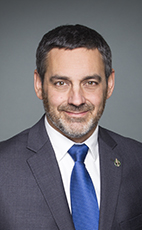Mr. Speaker, I would like to start by applauding my many colleagues who have worked tirelessly to address cyberbullying. The hon. members for Chicoutimi—Le Fjord and Dartmouth—Cole Harbour both feel strongly about that issue and have shown admirable dedication. The member for Gatineau also spoke on this issue on Wednesday. In her eloquent, nuanced and compassionate speech, she explained that politicians have a duty to take action on this issue.
I would like to touch on two topics today. First of all, this cyberbullying bill does talk about cyberbullying, as one would expect. However, it also touches on a wide variety of issues that have nothing, or very little, to do with cyberbullying. As these issues are covered in the bill, they must be discussed, although we would have preferred to stay focused on the most pressing issue.
The most pressing issue, of course, is cyberbullying. The traditional bullying that used to happen face to face in schoolyards has now become an after-school, underhanded and often anonymous activity. By its very nature, this type of bullying can occur at any time rather than only during the school day. There is no refuge; victims know that the violence will keep on going even if they try to ignore or escape from it.
Everybody can be a victim and it can happen anywhere. We know, however, that the victims are most often our children. With the current technology, it is all too easy to conduct heinous and malevolent attacks, a behaviour that likely reflects a more generalized malaise, as well as a lack of goals and optimism in our society. This new and violent phenomenon has a long-term impact on the lives of thousands of young people, as well as other individuals and families.
As is the case for any phenomenon that affects the health, safety and well-being of Canadians, elected officials must recognize the problem and take action. It is no longer a question of this being a good initiative, it is a question of our responsibility as elected officials. It is our duty to work together to identify the most effective legislative response as quickly as possible to help those who are persecuted and are suffering even today. It is our duty to not create distractions that could delay the implementation of measures, or even worse, undermine this objective.
Therefore, I wish to salute the people in this chamber who have tackled this issue, recognized the importance of this problem and listened to parents and those working in the schools. I am referring to the member for Chicoutimi—Le Fjord in particular, who channelled his long-standing passion for this issue into Motion No. 385 to create a national bullying prevention strategy. Unfortunately, in spite of my colleague's motion, we still do not have a strategy. I continue to hope that the government will move forward on this issue.
My colleague, the member for Dartmouth—Cole Harbour, made a point of meeting with the families and stakeholders following the death of a young girl whose name we are unfortunately all familiar with. This is a human tragedy that has been given a great deal of media coverage in recent months. We must also recognize the good intentions of our colleague from Vancouver Centre, who has also worked on this issue. We should also note this government's good intentions, because it is consulting the provinces and territories in order to find solutions. Everyone here agrees that we have a responsibility towards those who are victims of cyberbullying.
Bill C-540 illustrated the urgent need for action and, to that end, sought a consensus among parliamentarians devoid of any partisanship. The Conservatives told us that we had to be patient because there was work to be done, with the provinces and territories in particular, before such a bill could be passed. In the case of such crucial issues, it is good to hear about co-operation rather than confrontation.
In the end, the government introduced a bill very similar to the one brought forward by my colleague from Dartmouth—Cole Harbour. Bill C-13 would make it an offence under the Criminal Code to publish, distribute, transmit, sell, make available or advertise an intimate image of a person, knowing that the person depicted in the image did not give their consent, or being reckless as to whether or not that person gave their consent. The bill also allows courts to make an order to seize and electronically destroy the images and mentions the recovery of expenses incurred to obtain the removal of such images.
It becomes apparent that these clauses, in large part taken from Bill C-540, actually make up a small portion of Bill C-13. They account for roughly six or seven of the bill's 47 clauses. According to this Tuesday's Le Devoir, only three of the bill's 65 pages actually deal with cyberbullying.
I get the urge to end my speech right there, to sit back down and to rise again on a completely different subject, so that I can address the 40 or so other clauses in the bill that deal with completely different issues.
It is not a single bill we have before us, but two, three or even four bills.
It is as if, in response to the SARS crisis of 2003, the government had insisted on abolishing VIA Rail before moving to establish the Public Health Agency of Canada. It makes no sense. It is like holding an urgent public issue hostage.
The second part of Bill C-13 amends not only the Criminal Code, but also the Competition Act and the Terrorist Financing Act. It deals with banks' financial data, the theft of telecommunication services and telemarketing.

